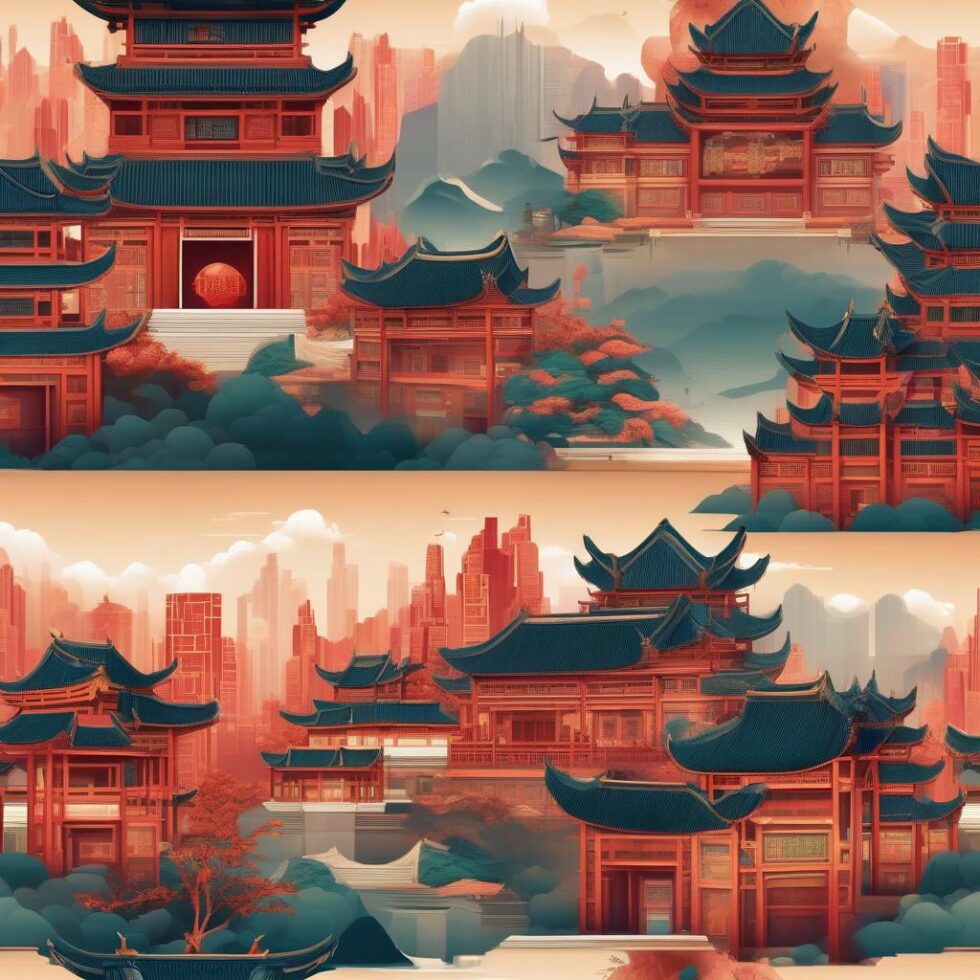
The subconscious of countries and institutions shapes their choices. How to speak to the CPC on a deeper, more soulful level and get it to see the broader, global reasons behind the market?
Do states or institutions have a subconscious, a character? Some psychiatrists, like Italian Narciso Mostarda, (see here) believe they do. If so, a state’s subconscious, its deep unspoken logic, is formed by its history—and mainly by the history their schools teach their people.
China’s deep instinct seems conditioned by a relentless drive for survival and expansion—until it reaches outright annihilation or subjugation of all possible rivals or challenges, and achieves total control over everything. It was initially shaped around the 4th-5th century BC, when states in the Central Plain (the cradle of Chinese civilization) were rapidly conquered and destroyed (mie). Out of hundreds of small states in the central plain in the 8th-7th century BC, only a few survived and ultimately emerged as the final unifiers. Eventually, only one survived, the Qin state.
A similar pattern emerged after the fall of the Han dynasty in the 3rd century AD until the Tang dynasty’s unification in the 7th century. This process was also made possible by relative geographic isolation—oceans and a small archipelago in the east (Japan) that was mostly harmless until recently, mountains in the south and west, deserts and steppes in the north.
So the periodic threat historically came from hungry, warring northern peoples who raided, invaded, and at times toppled the pacified populations of the Central Plains.
Unlike any other empires with undefined and often unstable natural and political borders, China, for two millennia, defined its rule according to some obvious limits that were difficult to overcome.
Survival and expansion have been the mantra of every dynasty. The Chinese Communist Party (CPC) is, in many ways, just a new dynasty, inheriting this subconscious, just like a grown man is shaped by his childhood experiences.
However, each dynasty had its own ideology to justify its rule—much like individuals justify their job and place in life at each phase of their life and career.
A first ideological element was based on the concept of the Mandate of Heaven, which posits that one’s right to rule is proven by their own rule. If you no longer govern effectively, you lose that Mandate, because you’ve lost Heaven’s approval. In other words, it’s a tautology: if you are successful, you are successful; if you lose, you deserve to lose.
It’s like living until your natural death because your lifespan ran out. Of course, doctors can then explain the cause of death—smoking, drinking, over-eating, etc. Similarly, a dynasty ends because the signs are there, and the new dynasty, with hindsight, can warn the current rulers to avoid the same mistakes.
Communist Adoption
That first ideology, borrowed and adapted by subsequent dynasties, was shaped by the Han at the turn of the first millennium. They combined a core of legalism, a veneer of Confucianism, and a bit of Taoist soul.
The mix produced what in modern times could be called “radical realpolitik”. This sentiment existed in the West as well but for millennia was tempered and at times thwarted by several factors – a Christian missionary spirit trying to save all people; the domestic division of powers between the ruler, the Church and the aristocracy; an external balance of powers that prevented any single state from gaining total control. This produced an ideology with many counterbalances and contradictions. In China, none of these factors existed. Domestic and external power followed a rigid hierarchy, and even ideology had a hierarchy: legalism was first, followed by Confucianism, and then Taoism, with some overlap and confusion, but a clear order.
In many ways, the communists adopted the same pattern. Still, they developed their own party logic—possibly more complex and deviating from the past—because this time, it was officially Marxist and therefore non-religious, i.e., without the mystical trappings of the Mandate of Heaven.
The communists also came to power after a long century of gradual foreign encroachment and disruption of the old order and dynasty (the Qing), without ever entirely replacing them. The Qing dynasty fought a war (17th century) and replaced the Ming dynasty. The Ming fought a war and replaced the Mongols (14th century), and so on, leading back to the pre-Tang chaos and the pre-Qin-Han independent states (pre-3rd century BC).
Meanwhile, the Qing Dynasty was challenged from 1840 onward by Western powers and the massive Taiping Rebellion. The post-1840 impact was more profound, as it involved smashing China’s millennia-old geopolitical boundaries. China was no longer the center of a mighty region that could ignore the rest of the world, but found itself overwhelmed by a much larger world it didn’t know how to cope with.
The Qing crushed the Taiping rebellion with foreign help, which didn’t result in immediate replacement—the way the Ming fell to the Qing, or the Tang taking over the Sui in the 7th century.
On the one hand, Western support for the Qing against a rebellion looked like the past, when the Manchu-Qing helped the Ming crush the Li Zicheng rebellion; this time, Western powers helped the Qing crush the Taiping.
However, Westerners didn’t take over and topple the Qing; actually, to some extent, they helped sustain the wobbling dynasty. Moreover, with their new interventions from regions that had never intervened in China, the past political geography was gone forever, and China, in this new Western world, had to think differently; yet, the Chinese struggled greatly in adapting to it.
Western powers maintained some control over the order that emerged in China, protecting their interests and pushing the Chinese rulers to adhere to Western norms. Still, they never outright took control of China. Instead, they spread their culture and worldview on a massive scale.
In the 17th century, the Manchu were called in by Ming loyalists to crush the Li Zicheng rebellion, eventually overthrowing the Ming. A similar pattern occurred when the Tang took over the Sui in the 7th century.
The Western pattern of behavior was at odds with Chinese tradition, and this may have contributed to the emergence of a new Chinese consciousness since the early 20th century. The imperial past came to be seen as the root of national humiliation.
Buddhism, meanwhile, changed China. It spread during the decline of the Han and through the long, turbulent five centuries before the Tang restored imperial order. But it was not driven by foreign pressure—no Indian kingdom pushed or forced China’s war-torn states to adopt Buddhist philosophy between the 3rd and 8th centuries.
The Western powers, by contrast, promoted their own culture, and although they didn’t take over the empire, they limited China’s influence and introduced new worldviews. In the 2nd-3rd century AD, Buddhism came to China and gradually radically changed the Chinese worldview, but it was not propped up by a foreign military threat. No Indian state sent troops to Xi’an.
Western values were conversely supported by Western military might. Western or Westernized (like Japan) powers explicitly aimed to set China on a new path without directly controlling the country. They promoted their culture and ideas. So, there were two unprecedented shocking events – the Westerners didn’t take over China (like the Qing had done) and promoted their own new worldview, which was changing China (unlike the soft penetration of Buddhism)
“Go to the place you know.”
The Party’s strategy has been to tap into Chinese tradition, as they are familiar with it, while maintaining a core of Marxist and Western ideology. Marxism legitimized their takeover—opposing the traditional failing imperial ideology—and responded to global demands from Western powers, whether allied (such as the USSR) or adversarial (like the United States and Europe).
The USSR managed to dominate China culturally and forcefully for over a decade—probably more than the Americans ever would. The Japanese, steeped in Chinese history and westernized themselves, tried (and failed) to revive a Qing-style takeover, similar to what the Mongols or Manchu had done before.
The US opposed Japanese ambitions because it saw a Japanese-controlled China as a major threat.
Since the groundbreaking bilateral rapprochement in the 1970s, the US has shown respect for China’s local order—even though it views communism as inimical—something again unprecedented in Chinese history. It promoted cooperation without the threat of force, but through peaceful discussion of the mutual benefits of the collaboration.
Perhaps, the deeply ingrained Chinese “realpolitik”/survival subconscious has never fully grasped how to process this US approach. Many Chinese might interpret this as hidden evil—believing the US secretly wants to control China through other means. Or it is proof of American weakness; the US can be easily pushed around and manipulated. Or a mix of the two.
Many works trying to explain China tend to interpret it through a Western lens—analyzing China for a Western audience based on Western values and viewpoints. While these are important, they are written for Western readers and reflect Western subconscious assumptions. They often fail to resonate with the Chinese themselves.
A real challenge is to frame the argument about what the US wants, and democracy based on China’s core survival subconscious, without the use of force. Can there be arguments that China could more readily relate to and accept based on its survival instincts?
Reasons for Democracy
There are three objective reasons why democracy is vital for China:
- For China’s economic survival, it must boost internal consumption—meaning more disposable income, a stronger welfare system, and consequently higher taxes. Therefore, it requires a popular vote, because nobody likes to pay taxes without knowing what they are for. This is also crucial to address the giant internal debt bubble.
- China needs to balance its trade—otherwise, its surplus becomes unsustainable on a global scale. A fully convertible currency is thus necessary. However, a convertible currency opens the gates to a possible financial crisis, which can spill over into a political crisis. Political turmoil can be peacefully managed with a democratic system. An authoritarian system can conversely break down during an economic crisis.
- Yes, a democracy that spills into chaos can lead to national collapse. But a well-balanced democracy can generate unparalleled consensus, which translates into enormous strategic strength.
The latest example is Israel’s 12-day victory over Iran. Many reasons for victory, but one key factor—Iran’s deep internal dissent and unrest—helped a vast Israeli spy network, supported locally, to identify targets and decapitate Iran’s system in hours.
Israel is tiny compared to Iran—about a tenth of its population. Yet, its democracy gave it a crucial weapon: internal and external consensus, which helped win the war. Hamas, its opponent in Gaza, claims a righteous cause—national liberation. But Hamas is fundamentally flawed: it is not liberal, oppresses its people, and preaches totalitarian, cruel theories. Therefore, its support is limited despite massive cash flows from friendly governments.
Western history and the Western ‘cultural occupation’ of the world exemplify the effectiveness of liberalism and open systems. Tiny Athens, with its democracy, stopped the Persian Empire. Republican Rome, organized like a private equity fund for war, defeated the Hellenistic kingdoms of the Eastern Mediterranean. The Italian city-states beat the Germanic Empire and halted the Turkish expansion. The more liberal English kingdom and the Dutch Republic defeated the Habsburgs, who ruled over half of Europe, as well as all the Americas, stretching to the borders of China and India. Eventually, a mix of liberal systems and private enterprise expanded worldwide.
Fragile China
Without democracy, China is weaker and more fragile.
Democracy wouldn’t eliminate all troubles, but it would smooth many of the rough edges—and give China a crucial modern international tool: a free press. Without it, honest reforms and real persuasion are much harder, because you have limited power to influence others domestically and internationally.
The current world order isn’t a zero-sum game; it’s based on a positive-sum system of theoretically fair, regulated trade. While it’s not perfect—there are moments of extreme realism—there’s also a balanced power system where hegemonies can happen to succeed each other peacefully. Consider how the US succeeded Britain.
Otherwise, if a new power tries to impose a new dominance forcibly, the system will react sooner or later. The incumbent hegemon will perceive a threat and could attempt to weaken or wipe out the rival—the Thucydides’ trap —even without directly trying to control it.
A practical problem is that China doesn’t truly know how to govern democratically. The experience of the past half-century was to introduce economic reforms, assuming politics would naturally follow.
But that entire package—political and economic liberalism—should have been offered as a take-it-or-leave-it choice. It wasn’t. As a result, China didn’t evolve into a full democracy, and the market economy without democratic politics has ultimately caused the current problems—bankrupt companies, irresponsible capital allocation, overcapacity, wage squeezes, and so on.
Since the late 1990s, the system was balanced only by rampant corruption, which redistributed pressures and income but was also slowly destroying the country.
Today, the concentration of power in Xi Jinping’s hands might actually present an opportunity. Excessive power held tightly and unchecked tends to become inefficient—that’s history. Power naturally tends to devolve, either spontaneously from the center or, once tensions mount, to break the system. Louis XIV centralized authority, and about a century later, the French Revolution broke out.
Can China release power in an orderly fashion? How? It would require a plan that aligns with China’s deep psychology—its subconscious, the core of its collective identity and history.










“(…) in cui le egemonie si susseguono pacificamente. Pensate a come la Gran Bretagna è stata succeduta dagli Stati Uniti.” ?
Sul serio ?
Due guerre gigantesche, imperniate sulla sfida (per l’ egemonia) lanciata dalla Germania al Regno Unito.
Sfida vinta in un senso : Impero Britannico sfibrato a morte.
Sfida persa in altro senso: Germania rasa al suolo e divisa (per di più ad esser stata un autentico “Heart of Darkness”, nel… “secondo tempo”).
USA e URSS ?
Qualche affinità con organismi opportunisti, capaci al riempire il vuoto (“ecosistemico”) creatosi.
Israele e dei “12 giorni” ?
Restano molto in gamba, quanto ai giorni del raid su Entebbe, pur essendo ormai a loro volta contagiati dalla “Pazzia Santa”, quella di quelle lande in cui risuona il saluto “Pace” (pace da R.I.P. , bah…).
Ma…
L’ Iran dello Scià (autoritario quanto l’ attuale, pur se là gli inturbantati allora sotto scacco, secolare) vero “cocco d’ anglosfera” : F-14 Tomcat (e i relativi missili Phoenix: unica volta ad essere stati concessi ad esportazione, aereo e missili…) i terra-aria Hawk, navi albioniche e britannici i carri “Shir Iran” (mai consegnati, con lo Scià caduto prima) etc.
Il “Gendarme del Golfo” e coccolato ?
Con il khomeinismo non più…
Tanto per dire: in Iran ancora in servizio dei sistemi Hawk (aggiornati alla “Si fa come si può”) e persino qualche F-14 (quasi mezzo secolo dopo e privo di assistenza: “roba” da triplano del Barone Rosso, ormai).
Israele non ha un aereo di combattimento che sia uno, sviluppato e prodotto in proprio: tutti quanti statunitensi e con massima libertà al “personalizzarli”, con sistemi indigeni, sconosciuta ad altri.
Denari e rifornimenti, alla fine intervento di bombardieri USA: la “nanerottolicità” israeliana, lasciata a sé sola ?
Bibi avrebbe dovuto magari optare per un onorevole seppuku (o forse no: si sarebbe provato a trovare un volonteroso sostituto per farlo in sua vece, da sopraffino furbone…).
Il subconscio ?
Non è qualcosa di “falsificabile” (in senso popperiano) che si tratti di un individuo come di un gruppo sociale (con questo tutto tranne che un mio negare di come il passato cucia il presente, entrambi e insieme imbastiscano il futuro…).
Mi diverto semmai a ricordare d’ una freddura di Faulkner, riferita ai suoi esordi da scrittore: rammenta di come a quei tempi tutti parlassero di Freud e del suo non averlo però letto; conclude dubitando che Melville possa mai averlo letto, con in più buona certezza che Moby Dick non l’ ha fatto.